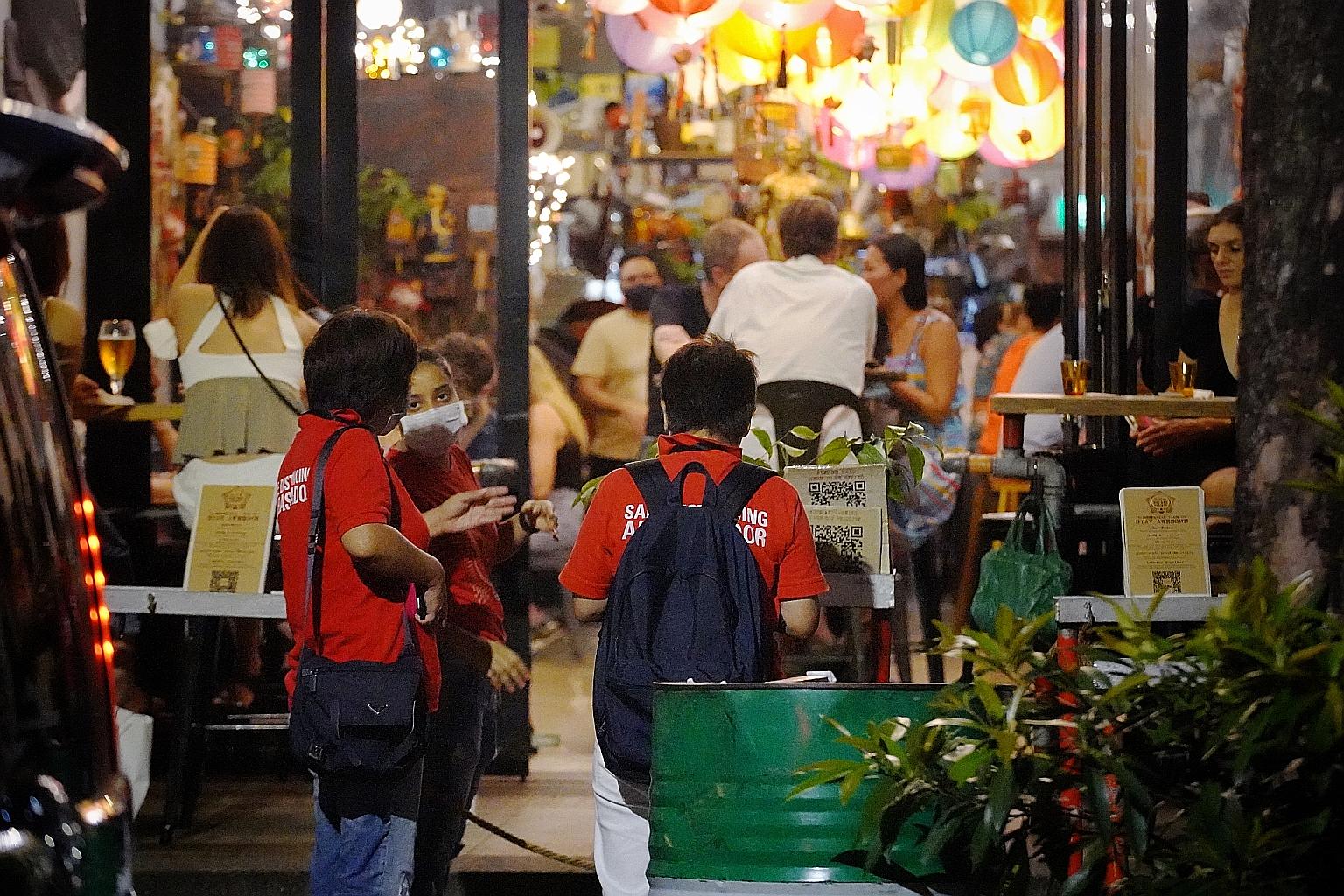Errant restaurants in Singapore play cat-and-mouse game to flout Covid-19 safe distancing rules
Sign up now: Get ST's newsletters delivered to your inbox

Safe distancing ambassadors speaking to a staff member of a restaurant in Telok Ayer Street on Friday.
ST PHOTO: JASON QUAH
Follow topic:
Enforcement officer John (not his real name for operational reasons) was shocked when he turned up at Hai Xian Lao restaurant in Shaw House to conduct an inspection on Aug 14.
He never expected that the safe distancing rules he was supposed to enforce would be used against him at the restaurant.
"The staff tried their best to delay our entrance into the premises, saying the restaurant was filled to capacity and said they had to take our temperatures before we could enter," said John, one of about 3,000 enforcement officers, safe distancing ambassadors and SG Clean ambassadors deployed daily throughout the island to ensure safe distancing rules are adhered to.
As the restaurant's staff stalled for time, the enforcement officers saw close to 30 customers exiting through the back door.
Investigations revealed that the customers were seated in a locked private room in the restaurant, which John said could hold only about 20 people comfortably.
"The staff knew they were in trouble but still verbally abused us, so we made it clear we had to call in the police," said John, 42, who is employed by the Singapore Tourism Board.
The hotpot restaurant was ordered to close for 10 days and fined $2,000 for the offences, which included not maintaining a 1m safe distance between groups of customers.
Last Saturday, John was in another enforcement blitz at about 11pm at Jiang Hu Xia Ke eatery in Orchard Plaza, where he sensed something was amiss with a table of four customers. The table had three teapots on it.
Besides the copious amount of tea the customers were supposedly drinking, the layer of condensation on the metal teapots made John suspicious since tea is usually served hot, not cold.
John's team sought out the eatery's supervisor, following their protocol. It took "persistent questioning" before the supervisor admitted that beer had been served to customers after 10.30pm, which is when the ban on the sale and consumption of alcohol kicks in under Covid-19 rules.
A customer later feigned ignorance of the teapot's contents, a common tactic that John has encountered when speaking with patrons who clearly knew they were flouting the rules.
"It is very obvious (that they know they are wrong). If they were unaware of the rules, they would not be so resistant. They would not avoid our questions or give illogical answers," said John.
Like the Shaw House restaurant, Jiang Hu Xia Ke eatery was ordered to close for 10 days after it was found that 13 customers were allowed to consume alcohol on its premises past the curfew.
John said thorough investigations are carried out before penalties are imposed.
"There is no one-size-fits-all (way to) closing cases and we need to ensure alleged offenders get a fair hearing," he said, adding that often, it was customers who were more unreasonable and difficult to manage than staff.
He said there could be instances where restaurants tried their best to enforce the rules - like not admitting groups larger than five - but ultimately, the staff would find a big group of friends seated together, even though they were split across more than one table.
"These (deceptions) would be assessed accordingly," he said.
Rules for F&B outlets and diners
Since the start of phase two of the reopening of Singapore's economy on June 19, customers have been allowed to dine in at eateries - subject to certain rules. Here are some:
• Sale and consumption of alcohol in all food and beverage (F&B) establishments are prohibited after 10.30pm daily. But enforcement checks found that some restaurants have continued to serve alcohol beyond the curfew, with some eateries concealing alcoholic beverages in teapots and empty green tea bottles to avoid detection.
• A group of diners in an F&B outlet must not exceed five, and keep a distance of at least 1m between groups. Gatherings or groups of more than five are barred, even if they are split across multiple tables. There should also be no mixing or mingling between groups. However, some restaurants were found to have accepted reservations or walk-ins of groups of more than five. Several eateries also sit these diners together at tables with more than five.
• If all members of a group of more than five are from the same household, they will be allowed to enter F&B establishments, or make bookings. However, they must sit at multiple tables, with no more than five per table and the tables spaced at least 1m apart. Establishments can request to verify diners' claims that they are from the same household, and reject diners from entering at their discretion. But eateries have found it difficult to verify diners' identities, without infringing the customers' privacy.
PENALTIES FOR OFFENCES
Under the Covid-19 (Temporary Measures) Act passed in Parliament on April 7, first-time offenders face a fine of up to $10,000, jail of up to six months, or both.
Subsequent offenders can be fined up to $20,000, jailed for up to 12 months, or both. For first-time safe-distancing offences, individuals face a $300 fine.
The Ministry of Health said on Sept 9 that businesses and individuals who flout the rules will have enforcement actions taken against them for the first offence, without a warning. Penalties could include fines, closures and prosecution, depending on the severity, it added.

